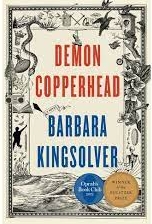Barbara Kingsolver
Harper Collins Books

“Poor Demon,” she said quietly. “Can’t they find anybody to adopt you?”
She’d only ever called me Damon before, like Mrs. Peggott and Aunt June, to show she was taking their side. I didn’t want to be poor anybody. But I felt like kissing Emily. Or throwing up, from how mixed up I was. Possibly both. You’d want to do it in the right order, though.
from Demon Copperhead
Enjoy in a bleak Steinbeckian way
Appalachia, child poverty, and the opioid epidemic, so yeah, this was probably never meant to be the feel-good book of the year. But it did receive the 2023 Pulitzer Prize for fiction, and deservedly so.
The story of Damon, nicknamed Demon, is straight out of Dickens, almost literally. Barbara Kingsolver (The Poisonwood Bible) was inspired by David Copperfield. Although an “entertainment,” Dickens was also showing the plight of the poor, especially of children caught in poverty, and trying to make his readers care.
The book opens, “First, I got myself born. A decent crowd was on hand to watch, and they’ve always given me that much: the worst of the job was up to me, my mother being let’s just say out of it.” Demon’s mother is a teenage girl strung out on drugs and unconscious on the floor of their single-wide trailer. His birth will foreshadow his life, “when your parent clocks out before you clock in.”
Growing up with his mom and her current boyfriend in one of those rundown trailers “where old furniture goes to die,” Demon finds small joys in small things, like playing in the muddy creek next to his home. His childhood ends abruptly at 10 when his mother dies of a drug overdose, either accidental or maybe she’d just become tired of surviving, and he’s on his own.
You can enjoy this novel in a bleak Steinbeckian kind of way (Remember all those happy Steinbeck endings? Expect bleak.) What saves the book from being a downer is Demon’s voice: sharp, perceptive, unsentimental, and irreverent (he has no time for God since clearly God has no time for him).
As in David Copperfield, Demon has to make his way in a broken world, peopled with memorable characters who either can’t help in spite of wanting to, or who just don’t want to. His lessons are hard earned: “The wonder is that you could start life with nothing, end with nothing, and lose so much in between.”
A school counselor tells him that he is resilient, and although he doesn’t know what the word means, he is. The reader cheers for him with each advance, weeps for him with each harsh set back, and begins to see through the eyes of the poor, to understand the hopelessness, even the anger and the striking out in despair: “I thought about what Rose said, wanting to see the rest of us hurt, because she was hurting. You have to wonder how much of the world’s turning is fueled by that very fire.”
Ultimately, Kingsolver achieves what Dickens did. She makes us care.
This review first appeared in The Columbia River Reader (June 15, 2023.) Reprinted with permission.

